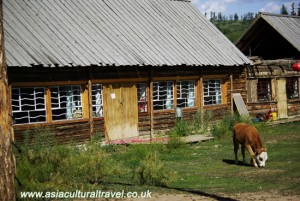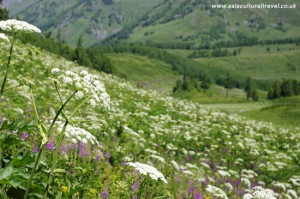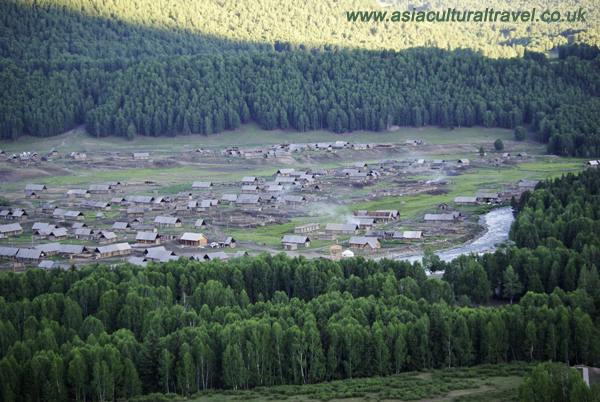Nestled within the Altay Mountains of northern Burqin County lies the small and tranquil village of Hemu. It is heralded as one of the six most beautiful villages in China and, once you catch a glimpse of it, you’ll soon see why. As the sun rises over the grasslands and illuminates the bright white birch forests nearby, smoke curls up from the chimneys of the village’s quaint log cabins, marking the beginning of a new day. The hundred or so families who live here will while away these daylight hours by grazing their sheep and cattle on the jade green pastures, washing their vegetables in the shimmering Hemu River, or simply taking a long horse-ride through the misty mountains. In summer, the place is awash with the lushest greens, while in autumn accents of gold, red, and purple fleck the landscape.
This rustic paradise, also known as Horm Village, has been home to the native Tuvan people for over a thousand years. Along with Baihaba Village, it is one of the largest Tuvan villages in China, although it also boasts small communities of Mongolian and Kazakh people. The Tuvans are a Siberian people who have Mongolian, Turkic, and Samoyedic roots. Although tourism has now become an important part of their annual income, many of them continue to make a living by hunting and raising animals. In fact, they farm anything from sheep and cows to yaks and even reindeer! They build their log cabins by hand using wood harvested from the nearby forests, which means the village seamlessly blends in with its natural surroundings. Many of the homes have a portrait of Genghis Khan hanging over their fireplace, as the Tuvans believe that they are descended from the soldiers of his ancient and mighty army. So it goes without saying that you shouldn’t get on their bad side!
 That being said, the villagers are well-known for their incredible hospitality and will happily welcome visitors into their humble homes. And what better way to greet guests than with snacks! Normally they will receive guests with an array of delicious home-made dairy products, such as yogurt, milk wine, milk tea, and freshly baked cakes. Generally speaking, it is not considered impolite to refuse the food, but some B&Bs will welcome visitors with a Tuvan tradition involving two compulsory bowls of milk tea. The host will pour the first bowl and offer the drinker butter, which they can add to taste. As soon as the first bowl is finished, the host will fill it again. According to local belief, it is this second bowl that will grant the drinker good luck. That is, unless you’re lactose intolerant!
That being said, the villagers are well-known for their incredible hospitality and will happily welcome visitors into their humble homes. And what better way to greet guests than with snacks! Normally they will receive guests with an array of delicious home-made dairy products, such as yogurt, milk wine, milk tea, and freshly baked cakes. Generally speaking, it is not considered impolite to refuse the food, but some B&Bs will welcome visitors with a Tuvan tradition involving two compulsory bowls of milk tea. The host will pour the first bowl and offer the drinker butter, which they can add to taste. As soon as the first bowl is finished, the host will fill it again. According to local belief, it is this second bowl that will grant the drinker good luck. That is, unless you’re lactose intolerant!
In terms of spiritual belief, the Tuvan are firm followers of both Tibetan Buddhism and a folk religion known as Tengrism. This Central Asian faith borrows features from shamanism[1], animism[2], and ancestor worship, and was once the prevailing religion of the Turks, Mongolians, and Hungarians. The rich tapestry of customs and beliefs that the Tuvan subscribe to can be felt most palpably in their lively religious festivals, so plan your visit carefully if you want to experience one.
 The village itself is only 70 kilometres (43 mi) away from Kanas Lake, so it’s a popular stop for tourists on their way to the Kanas Lake Nature Reserve. If you’re a fan of hiking, then there is a short hike that leads to a nearby observation platform, which yields stunning panoramic views of the village and the surrounding countryside. For the more adventurous hikers, we recommend venturing out onto the Hemu Grassland, although we strongly advise that you take a local guide with you as the routes are quite treacherous and the local wild boar can be dangerous if encountered. If you’re lucky, you may even come across a cluster of pearl white yurts. Some of these belong to the local Tuvan people, but others are the temporary homes of the Kazakh ethnic minority. Like the Tuvans, the Kazakhs are exceptionally friendly and will happily welcome visitors into their yurt. Just be sure to ask for permission first!
The village itself is only 70 kilometres (43 mi) away from Kanas Lake, so it’s a popular stop for tourists on their way to the Kanas Lake Nature Reserve. If you’re a fan of hiking, then there is a short hike that leads to a nearby observation platform, which yields stunning panoramic views of the village and the surrounding countryside. For the more adventurous hikers, we recommend venturing out onto the Hemu Grassland, although we strongly advise that you take a local guide with you as the routes are quite treacherous and the local wild boar can be dangerous if encountered. If you’re lucky, you may even come across a cluster of pearl white yurts. Some of these belong to the local Tuvan people, but others are the temporary homes of the Kazakh ethnic minority. Like the Tuvans, the Kazakhs are exceptionally friendly and will happily welcome visitors into their yurt. Just be sure to ask for permission first!
[1] Shamanism: The practice of attempting to reach altered states of consciousness in order to communicate with the spirit world and channel energy from it into the real world. This can only be done by specialist practitioners known as shaman.
[2] Animism: The belief that all non-human entities, including animals, plants, and even inanimate objects, possess a spiritual essence or soul.
